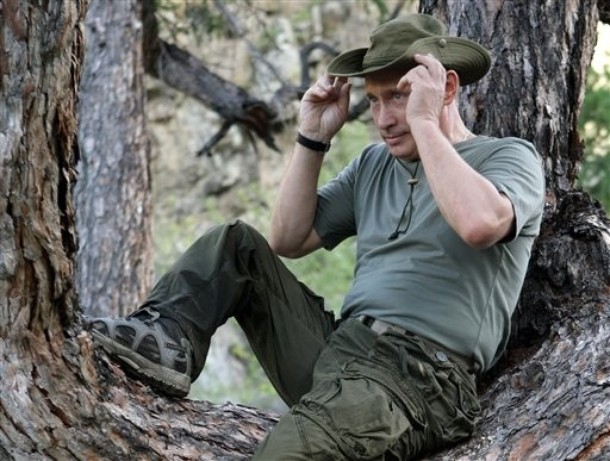
Ten Years at the Helm: Putin Holds a Photo Shoot and Visits Turkey
Publication: Eurasia Daily Monitor Volume: 6 Issue: 153
By:

It appeared to be just another of ailing President Boris Yeltsin’s oddities when on August 9, 1999 he appointed Vladimir Putin as prime minister and announced his support for this unknown bureaucrat as the next president of Russia. In a matter of a few weeks Putin’s campaign gained an unstoppable momentum – and throughout this decade he has remained the master of Russian politics. It was the brutal suppression of the secessionist rebellion in Chechnya depicted as Russia’s "war on terror" that convinced Russians that Putin was indeed the leader they were collectively longing for (Nezavisimaya Gazeta, www.grani.ru, August 7). The war was brought to a conclusive end, and despite the widespread and deepening instability in the North Caucasus, Putin’s claim over achieving victory remains undisputed. The war with Georgia, which was also remembered last weekend on its first anniversary, was portrayed as a triumph, but in fact it has seriously undermined Russia’s position in the Caucasus (Kommersant, Nezavisimoe voennoe obozrenie, August 7). Meanwhile, Putin has moved on to other matters.
It is the gas business that now primarily attracts his attention, and only a select few of his trusted lieutenants from the special services, the so-called siloviki, have made the transition with him. Always attuned to public relations, Putin opted for a business-trip to Turkey to mark his jubilee, and has every reason to portray this visit as a success. The contract on building the first nuclear power plant in Turkey could be a significant breakthrough for Rosatom, which has not exactly boosted its international reputation with the controversial Bushehr project in Iran due to be finished this year (www.gazeta.ru, August 7). Far more significant, however, was the deal on constructing the South Stream gas pipeline across Turkey’s exclusive economic zone in the Black Sea, which was the main goal of Putin’s trip. The competition with the E.U.-backed Nabucco project has become a personal issue for him and he is prepared to fight it out (Kommersant, August 7). In his opinion, it is not in the European market but at the entry point that the outcome of this pipeline race will be decided, so Moscow is playing hard-ball in Turkmenistan seeking to divide its resources with China and Iran. Without Turkmen gas, the only hope for Nabucco is Iraq, but counting on stable production in Kurdistan remains a high-risk option.
One point that is often overlooked in the commentary on this clash of pipelines is that Moscow is mildly irritated with the Nabucco project but not really too concerned, since the real aim of its pipeline strategy is not more gas to Europe but bypassing Ukraine (Vedomosti, August 7). Towards this aim, Russia is prepared to double its gas export to Turkey through the expanded Blue Stream pipeline, implicitly encouraging its ambition to become a "gas hub" and not merely a transit state. The E.U. is not enthusiastic about such a prospect and Putin expects that Turkey’s hard bargaining will make Russian gas more attractive. Ukraine, however, is the designated loser as Russia plans to reduce its transit by more than a half. Kyiv has just delivered the monthly payment for the gas it imported in July, but Putin knows perfectly well that negotiations on emergency loans with the E.U. are not going well, so Ukraine’s insolvency is only a question of time (RBC Daily, August 7).
The point about how Ukraine’s financial troubles could possibly suit Russian interests constitutes a part of the larger issue about the agenda of Putin’s gas policy. Sound goals such as maximizing profits are certainly present in this agenda but there are other elements that could hardly be rationalized from the point of view of business logic (Ezhednevny Zhurnal, August 6). The desire to boost Russia’s international profile is not malignant in itself, but it translates into an obsessive urge to show its neighbors who are the master in the post-Soviet house and to punish the malcontents. This bullying is bad for the gas business but Gazprom has internalized it as a feature of Putin’s personal style of leadership.
Ten years at the summit of power has inevitably inflated Putin’s self-perception and the photo-session from his recent short outdoor vacation in Tuva provided fresh evidence. A choir of courtiers is probably praising the good looks of their boss and asserting that the picture of his muscular torso will give his popularity a new boost. Consequently, it is difficult indeed to hear the voice of common sense suggesting that such PR is slightly ridiculous (www.gazeta.ru, August 6). Economic troubles were not allowed to spoil Putin’s trip to the Far East and he found time to go to the bottom of Lake Baykal in the Mir submersible and to gently pat a beluga whale in the Sea of Okhotsk (Nezavisimaya Gazeta, Vremya Novostei, August 3). That is exactly what his premiership was intended to convey: having fun, while making sure that governors are duly disciplined, while accepting the manifestations of loyalty from joyful crowds. The unexpected recession has turned the public mood rather sour, but Putin refuses to compromise on the first part of the plan.
This extra-VIP tourism will hardly help to restore economic confidence, as Putin’s methods of managing the economy are limited to distributing oil revenues and tightening state control, are proving inefficient in checking the deepening crisis. President Dmitry Medvedev is trying to listen to more liberal economic opinions and has started to question the rationale behind pouring money into huge state corporations, including Russian Technologies, which instead of playing the role of "locomotives" have become a massive liability (www.newsru.com, August 7). Medvedev continues to repeat his claim that Russia will emerge from the crisis as a modernized and re-energized state. However, he is unwilling to admit that the shedding of Putin’s heritage of rigid centralization is a pre-condition for such a recovery. The feeble economy is only part of the larger problem of a stagnating country, and Russians will have to go through some bitter self-assessment in order to regain the ability to see their "dear leader" as a scantily dressed quasi-emperor.




